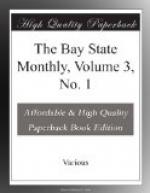The honor of the name Dorchester appears to belong to Rev. John White, minister of a town of the same name in the mother country, who planned and encouraged the exodus to America. But the hardy little band of exiles who received the title from old Cutshumaquin, the successor of Chickatabat, little knew what their wild territory was destined to become in the course of a hundred years. They were loyal subjects of the English throne, building their log cabins and rude meeting-house on Allen’s Plain under protection of a charter from King Charles; there they hoped to found a permanent town, where the worship of God should be maintained in accordance with the dictates of the Puritan conscience, without interference of churchman, Roman Catholic, Baptist, or Quaker. There was room in the unexplored forests to the south for pasturage and for the overflow, whenever, as Cotton Mather said when the whole state contained less than six thousand white inhabitants, “Massachusetts should be like a hive overstocked with bees.”
The first meeting-house in Dorchester, a very unpretentious structure of logs and thatch, was completed in 1631, and no free-holder was allowed to plant his domicile farther than the distance of half a mile from it, without special permission of the fathers of the town. It stood near the intersection of the present Pleasant and Cottage streets, and that portion of the former highway between Cottage and Stoughton streets is supposed to have been the first road laid out in the early settlement. Shortly after, this road was extended to Five Corners in one direction, and to the marsh, then called the Calf Pasture, in the other. The present names of these extensions are Pond street and Crescent avenue. From Five Corners a road was subsequently laid out running, north-east to a point a little below the Captain William Clapp place, where there was a gate which closed the entrance to Dorchester Neck, where the cattle were pastured. It was on this street that Rev. Richard Mather, the first minister of the town, Roger Williams, of Rhode Island fame, and other distinguished citizens resided. The next undertaking in the way of public improvements was the building of two important roads, one leading to Penny Ferry, thus opening a highway of communication with the sister Colony at Plymouth; the other leading to Roxbury, Brookline and Cambridge.
In Josselyn’s description of the town soon after its settlement may be read:
“Six myles from Braintree lyeth Dorchester, a frontire Town, pleasantly situated and of large extent into the maine land, well watered with two small rivers, her body and wings filled somewhat thick with houses, ... accounted the greatest town heretofore in New England, but now giving way to Boston.”
Through what hardships and privations this infant freehold was maintained can be understood by those only, who have read the records of the colonial struggle against a sterile soil, a rigorous climate, grim famine,




